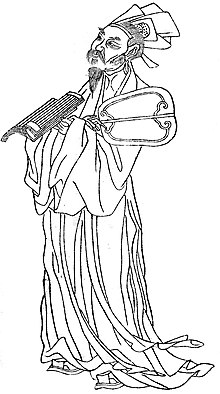Liu Zhangqing
Liu Zhangqing | |||||||||
|---|---|---|---|---|---|---|---|---|---|
劉長卿 | |||||||||
 Liu Zhangqing. | |||||||||
| Born | 709 | ||||||||
| Died | 785 (aged 75–76) China | ||||||||
| Occupation(s) | Poet, politician | ||||||||
| Chinese name | |||||||||
| Traditional Chinese | 劉長卿 | ||||||||
| Simplified Chinese | 刘长卿 | ||||||||
| |||||||||
| Wenfang | |||||||||
| Chinese | 文房 | ||||||||
| |||||||||
Liu Zhangqing[1] (Wade–Giles: Liu Chang-ch'ing; ca. 709–785), often read and Romanized as Liu Changqing,[a] courtesy name Wenfang (文房), was a Chinese poet and politician during the Tang dynasty. Eleven of his poems are included in the popular anthology Three Hundred Tang Poems.[4]
Biography
[edit]Different sources place the year of Liu Zhangqing's birth as early as 709 and as late as 726.[b] He came from the city of Xuancheng. Although his ancestral hometown was Hejian, he spent most of his youth in Luoyang, the eastern capital of the Tang dynasty. Liu obtained his Jinshi title around 750s. In 780, he was appointed governor of Suizhou in Henan province. Because of this, his contemporaries often referred to him as Liu Suizhou.[5]
Like his birth, the year of his death is uncertain. One source says he died around 786.[c]
Poetry
[edit]During his lifetime, Liu's poems did not receive much praise, although he was one of the representative poets during the reign of Emperor Dezong. Later generations, however, have acknowledged his skill as a poet. Liu was especially skillful in writing of poems with 5 characters.[6][7]
An example:
While Visiting on the South Stream the Taoist Priest Chang (尋南溪常山道人隱居)[8]
一路經行處, Walking along a little path, ;
莓苔見履痕, I find a footprint on the moss.
白雲依靜渚, A while cloud low on the quiet lake
春草閉閒門。 Grasses that sweeten an idle door.
過雨看松色, A pine grown greener with the rain;
隨山到水源, A brook that comes from a mountain source –
溪花與禪意, And, mingling with Truth among the flowers,
相對亦忘言。 I have forgotten what to say.
See also
[edit]- Guqin history (includes one poem with sound track)
- Huang Ruheng (a Ming Dynasty calligrapher of Liu)
Notes
[edit]- ^ 長 can be pronounced both as cháng (long) and zhǎng (elder), while the former is more commonly used in Standard Chinese. In the context of Liu Zhangqing's name, the correct pronunciation should be zhǎng.[2][3]
- ^ Ueki et al. (1999, p. 104) give "726?", Maruyama (1994) gives "725?", while World Encyclopedia gives "710?" and Britannica Kokusai Dai-Hyakkajiten gives 709. Daijirin does not give a date for his birth.
- ^ Ueki et al. (1999, p. 104) and Daijirin give "786?", Britannica Kokusai Dai-Hyakkajiten gives 785, World Encyclopedia gives "785?", while Maruyama (1994) gives "791?". Daijirin does not give a date for his death.
References
[edit]- ^ Raft, Zeb (2019). "Two Words, and Two Kinds of Poetry, in the Work of Liu Zhangqing". Archiv orientální.
- ^ Cheung, Hin-yuen; 張衍源 (2002). "A study of Liu Zhangqing (726-788)". HKU Theses Online (HKUTO). doi:10.5353/th_b4457001.
- ^ Raft, Zeb (2016). "Translation as a Means to the Discovery of Poetic Argumentation: An Experiment with the Tang Poet Liu Zhangqing". Journal of Oriental Studies.
- ^ Watson, 117
- ^ 《唐诗大辞典修订本》
- ^ 《中国历代人名大辞典》
- ^ 《唐诗大辞典》
- ^ Bynner. An anthology of 320 poems. Discover Chinese poetry in its golden age and some of the greatest Chinese poets.
Works cited
[edit]- "Liu Zhangqing (Ryū Chōkei in Japanese)". Britannica Kokusai Dai-Hyakkajiten (in Japanese). Encyclopædia Britannica, Inc. 2014. Retrieved 2017-06-25.
- "Liu Zhangqing (Ryū Chōkei in Japanese)". Daijirin (in Japanese). Sanseidō. 2006. Retrieved 2017-06-25.
- Maruyama, Shigeru (1994). "Liu Zhangqing (Ryū Chōkei in Japanese)". Encyclopedia Nipponica (in Japanese). Shogakukan. Retrieved 2017-01-29.
- Ueki, Hisayuki; Uno, Naoto; Matsubara, Akira (1999). "Shijin to Shi no Shōgai (Ryū Chõkei)". In Matsuura, Tomohisa (ed.). Kanshi no Jiten 漢詩の事典 (in Japanese). Vol. 1. Tokyo: Taishūkan Shoten. pp. 104–105. OCLC 41025662.
- Watson, Burton (1971). CHINESE LYRICISM: Shih Poetry from the Second to the Twelfth Century. New York: Columbia University Press. ISBN 0-231-03464-4
- "Liu Zhangqing (Ryū Chōkei in Japanese)". World Encyclopedia (in Japanese). Heibonsha. 1998. Retrieved 2017-01-29.
External links
[edit]- Works by Liu Zhangqing at LibriVox (public domain audiobooks)

- Books of the Quan Tangshi that include collected poems of Liu Zhangqing at the Chinese Text Project:


 French
French Deutsch
Deutsch